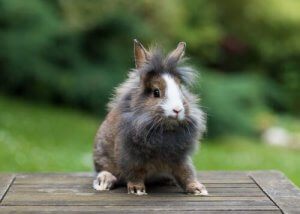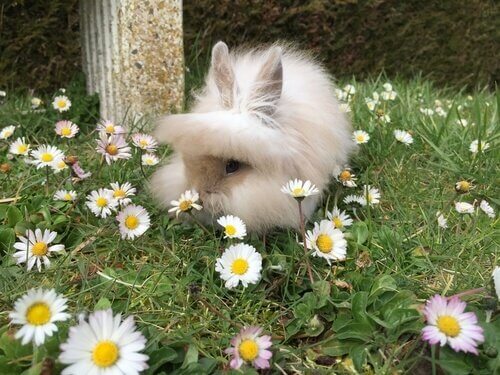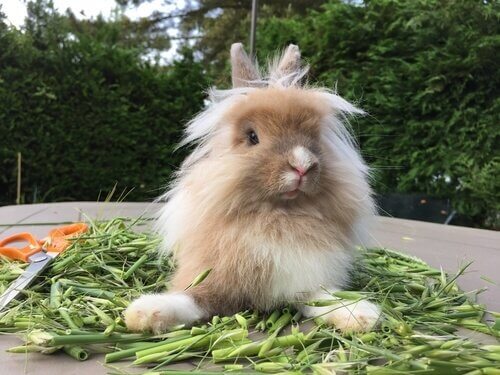Everything You Need to Know about the Lionhead Rabbit

By looking at the name above, you’ll surely get an idea of what this rabbit looks like. Keep reading to find out all about the very cute Lionhead rabbit!
History and characteristics of the Lionhead rabbit
The Lionhead rabbit differs from others of its kind because it has, as its name suggests, a mane of fur that is longer than the hair on the rest of his body. This hair falls off when it reaches adulthood. In turn, at six months, its thick coat changes to a softer one.
Some specimens have a double layer of hair and others just one. As for their color, this can vary, but they only usually have two hair colors.
As for its size, the Lionhead rabbit can weigh about two kilos. Their ears, which reach three inches long, are quite striking on this small sturdy animal. Their legs are thicker than in other breeds and their eyes can be red, blue or brown.

Not much is known about the origins of the breed, but it is known that it comes from the cross between a Belgian Dwarf and a Swiss Fox. It is also related to dwarf rabbits. The breed came out of Belgium and England. Even today, it is not an official breed in most countries, due to the loss of its characteristic mane after two years of age.
Diet and care for the Lionhead rabbit
With a perfect temperament for a pet (calm and affectionate), the Lionhead rabbit is an ideal choice for a home with children. To keep your pet in good condition and for it to enjoy excellent health, we recommend that you follow this advice:
1. Diet
Your veterinarian can tell you which foods are the best and what quantities they need, according to their age. In general, it is estimated that for every half kilo of weight, you must give your pet 1/8 cup of rabbit feed.
The meal should be complemented with fresh leafy vegetables, such as lettuce or Swiss chard. Don’t give him broccoli because it’s rich in calcium and increases the chance of kidney stones.

You can give them ‘sweets’ like banana, apple or carrot in small daily amounts, and make sure you never forget to leave fresh water in his cage. Never give him sweet things like cookies, because their bodies don’t tolerate sugar.
2. Cage
Your rabbit’s living space should be as big as possible. If you have a backyard or a park nearby, allow him to exercise for a bit every day, but never at the hottest hours or at night in winter. If you live in an apartment, its cage should be big enough for it to move easily. Remember to clean the cage, and remove food debris and waste.
3. Hair
Weekly brushing is essential to keep the hair free of knots, mainly in the mane. Also, this way you can prevent the rabbit from swallowing his hair and forming balls in his stomach, something that is not only limited to cats. It isn’t necessary to bathe them, but instead, keep their surroundings clean.
4. Teeth
One of the characteristics of rabbits in general, and the Lionhead rabbit in particular, is that their teeth never stop growing. Because of this, they have to file them down in some way. How? By nibbling woods or cardboard without any ink on it.
5. Veterinarian
As a general rule, you should take your rabbit to the vet at least once a year. Keep up with the vaccination schedule given to you by your vet and pay close attention to the following symptoms that may indicate diseases: weight loss, decline, wet chin, watery eyes, diarrhea or discharges from the nose.
The Lionhead rabbit is an excellent pet. If you care for it well it will live happily and healthily for up to 10 years.
By looking at the name above, you’ll surely get an idea of what this rabbit looks like. Keep reading to find out all about the very cute Lionhead rabbit!
History and characteristics of the Lionhead rabbit
The Lionhead rabbit differs from others of its kind because it has, as its name suggests, a mane of fur that is longer than the hair on the rest of his body. This hair falls off when it reaches adulthood. In turn, at six months, its thick coat changes to a softer one.
Some specimens have a double layer of hair and others just one. As for their color, this can vary, but they only usually have two hair colors.
As for its size, the Lionhead rabbit can weigh about two kilos. Their ears, which reach three inches long, are quite striking on this small sturdy animal. Their legs are thicker than in other breeds and their eyes can be red, blue or brown.

Not much is known about the origins of the breed, but it is known that it comes from the cross between a Belgian Dwarf and a Swiss Fox. It is also related to dwarf rabbits. The breed came out of Belgium and England. Even today, it is not an official breed in most countries, due to the loss of its characteristic mane after two years of age.
Diet and care for the Lionhead rabbit
With a perfect temperament for a pet (calm and affectionate), the Lionhead rabbit is an ideal choice for a home with children. To keep your pet in good condition and for it to enjoy excellent health, we recommend that you follow this advice:
1. Diet
Your veterinarian can tell you which foods are the best and what quantities they need, according to their age. In general, it is estimated that for every half kilo of weight, you must give your pet 1/8 cup of rabbit feed.
The meal should be complemented with fresh leafy vegetables, such as lettuce or Swiss chard. Don’t give him broccoli because it’s rich in calcium and increases the chance of kidney stones.

You can give them ‘sweets’ like banana, apple or carrot in small daily amounts, and make sure you never forget to leave fresh water in his cage. Never give him sweet things like cookies, because their bodies don’t tolerate sugar.
2. Cage
Your rabbit’s living space should be as big as possible. If you have a backyard or a park nearby, allow him to exercise for a bit every day, but never at the hottest hours or at night in winter. If you live in an apartment, its cage should be big enough for it to move easily. Remember to clean the cage, and remove food debris and waste.
3. Hair
Weekly brushing is essential to keep the hair free of knots, mainly in the mane. Also, this way you can prevent the rabbit from swallowing his hair and forming balls in his stomach, something that is not only limited to cats. It isn’t necessary to bathe them, but instead, keep their surroundings clean.
4. Teeth
One of the characteristics of rabbits in general, and the Lionhead rabbit in particular, is that their teeth never stop growing. Because of this, they have to file them down in some way. How? By nibbling woods or cardboard without any ink on it.
5. Veterinarian
As a general rule, you should take your rabbit to the vet at least once a year. Keep up with the vaccination schedule given to you by your vet and pay close attention to the following symptoms that may indicate diseases: weight loss, decline, wet chin, watery eyes, diarrhea or discharges from the nose.
The Lionhead rabbit is an excellent pet. If you care for it well it will live happily and healthily for up to 10 years.
All cited sources were thoroughly reviewed by our team to ensure their quality, reliability, currency, and validity. The bibliography of this article was considered reliable and of academic or scientific accuracy.
Kovalik, M., Thoday, K. L., Eatwell, K., & van den Broek, A. H. M. (2012). Successful Treatment of Idiopathic Sebaceous Adenitis in a Lionhead Rabbit. Journal of Exotic Pet Medicine. https://doi.org/10.1053/j.jepm.2012.09.009
This text is provided for informational purposes only and does not replace consultation with a professional. If in doubt, consult your specialist.








